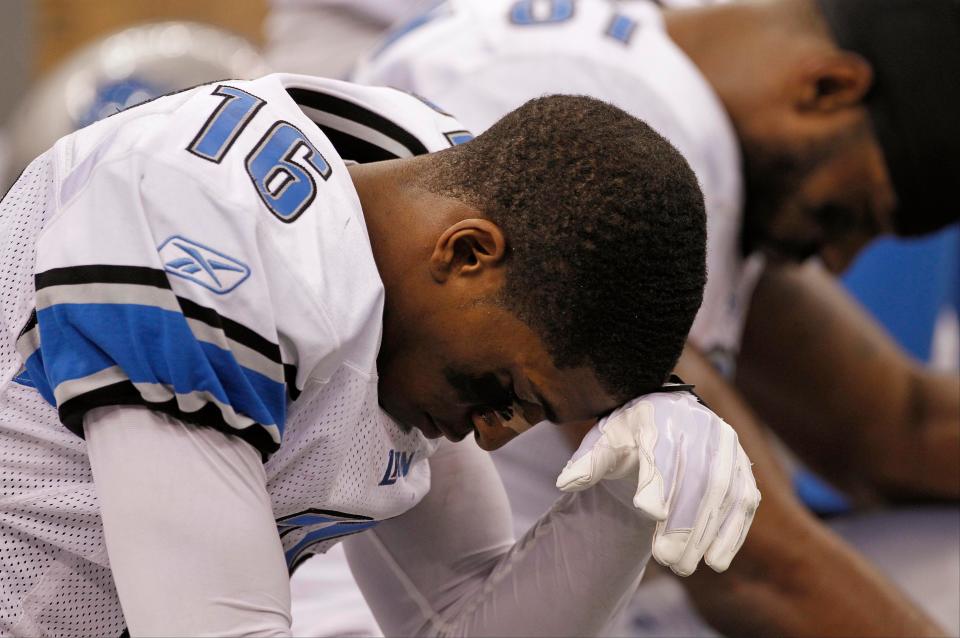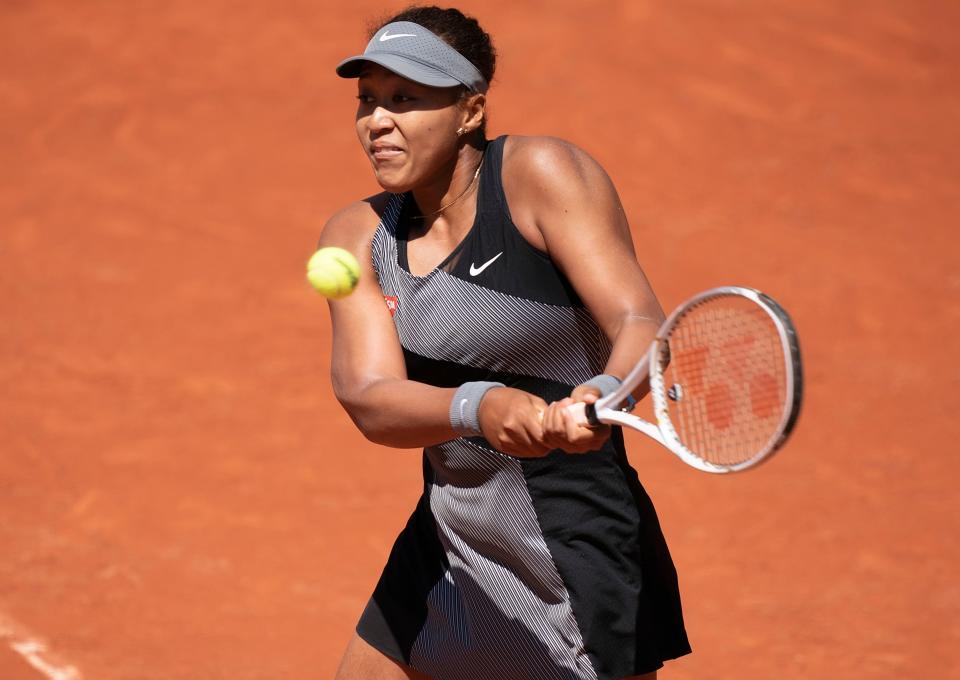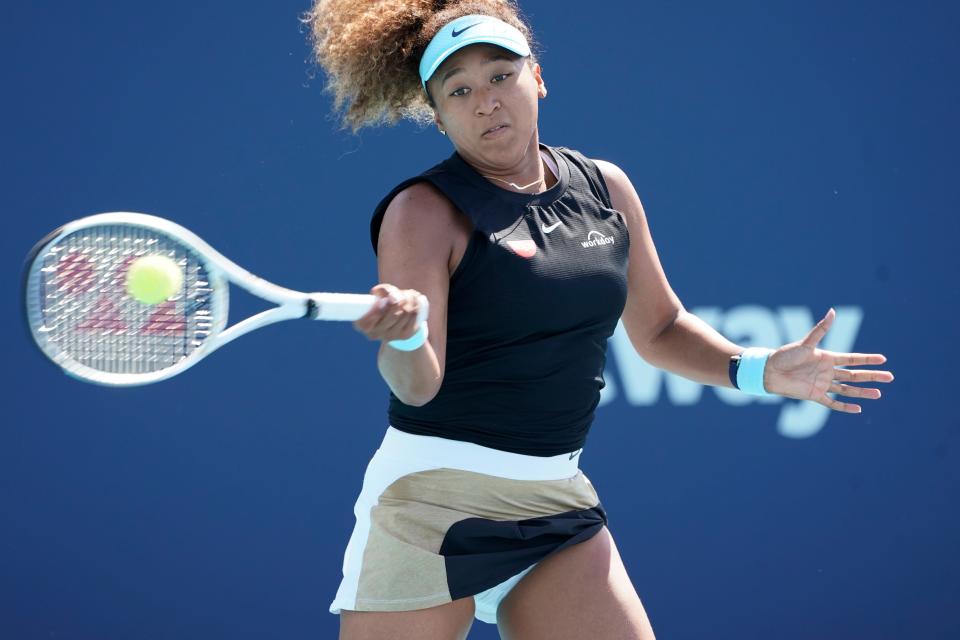Titus Young and Naomi Osaka remind us of the struggle with mental illness in sports
I hadn’t thought about Titus Young in a long time. Maybe months but probably years. It’s still hard to think about the Detroit Lions’ troubled former receiver and the sad trajectory his life took over his misunderstood struggle with mental illness.
The troubles with the Lions were just the start. Once Young was cut and out of the NFL, his life spiraled into a series of arrests over illegal activity and violent behavior. He was diagnosed with bipolar disorder and said he heard voices that told him to do bad things.

I did a lot of reporting on Young’s struggles and it bothered me immensely. We had bonded over how we both grew up in Los Angeles and I had seen him go from being a happy, promising, young player, with the Lions from 2011-12, to being a tragic figure ridiculed for his criminal acts and scorned for wasting an NFL career.
[ From 2018: Titus Young released from a California prison ]
My family has a history with mental illness and specifically bipolar disorder. I recognized it early in Young. I pleaded with his father to remove him from the pressure-cooker life in the NFL and to get his son some help. I told other reporters that Young’s behavior was a lot more than just a bad guy acting out and to be careful not to simply demonize Young.
Some people didn’t believe me. His father didn’t want to hear it. Young especially didn’t accept it.
“When I was first diagnosed, I didn’t want to believe it because I felt my life was too perfect to have bipolar,” he wrote in a diary excerpt published by the L.A. Times. “Football players don’t take medicine. I’m macho. Put me back on the field. But, no, that’s really not what I needed.”
It still hurts to think about Young, which is probably why he had been largely absent from my thoughts until this week, when Naomi Osaka withdrew from the French Open and brought the issue of mental illness to the forefront of sports.
Osaka is the world’s most highly paid female athletes and tennis’ second-ranked female player. Yet even she struggled to have people understand her battle with anxiety and depression before she withdrew Monday following days of controversy over her initial statement that she would not attend mandatory news conferences at Roland Garros.

Osaka’s initial muddled message on Twitter last week expressed her trepidation over doing press conferences but also attacked journalists and tournament organizers. It invited plenty of criticism. I admit I doubted whether Osaka was being sincere about her mental-health struggles or using them as a convenient excuse to avoid an obligation she disliked.
The French Open doubted her, too. It threw some subtle shade at Osaka in a tweet that was later deleted and fined her $15,000 for skipping her first press conference. Organizers for the four Grand Slam events issued a joint statement that she could face expulsion if she continued to ignore her media obligations.
Then things changed.
Osaka reminded us that even winners don’t always win and that the biggest sports stars on the planet are subject to the same human frailty as the rest of us, though they must navigate their difficulties on a much more public plane.
On Monday, Osaka pulled out of the French Open and explained her reason much better this time on Twitter. She was withdrawing for her own “well-being” and said he has dealt with anxiety and “long bouts of depression” since she won the first of her four Grand Slam titles at the 2018 U.S. Open.
“I never wanted to be a distraction and I accept that my timing was not ideal and my message could have been clearer,” she tweeted. “More importantly I would never trivialize mental health or use the term lightly.”
Public perception quickly changed and she received an outpouring of support from every corner of the sports world. Martina Navratilova, who initially criticized Osaka while she was doing television commentary during her first match, reversed course and offered her support.
“As athletes we are taught to take care of our body,” Navratilova tweeted, “and perhaps the mental & emotional aspect gets short shrift.”
I understand some people don’t want to hear this. Some of us just want our nightly home-run and slam-dunk highlights. Maybe some of us would rather believe athletes are modern-day gladiators performing for our entertainment and nothing more. Turn off the TV and they don’t exist.
Of course, athletes are more than that. And the tragedy — yes, the tragedy — is precisely that there’s still a stigma attached to mental illness and that no one really wants to hear about it, especially from millionaire professionals. Teams, teammates and fans have no problem with physical injuries. In fact, leagues love to give out awards for comeback players that almost always have to do with an injury or illness.
But that’s changing. In 2007, former Detroit Tiger Dmitri Young was named National League Comeback Player of the Year with Washington after he was in treatment for substance abuse and depression and had pled guilty to assaulting his girlfriend while with the Tigers.

In 2019, New York Islanders goaltender Robin Lehner was awarded the NHL’s Bill Masterton Trophy after he publicly revealed struggles with alcoholism and bipolar disorder. The next year, Ottawa Senators forward Bobby Ryan (who played for the Red Wings this season) won the Masterton after he disclosed he was an alcoholic and had post-traumatic stress disorder.
NBA stars Kevin Love and DeMar DeRozan have been vocal about their struggles with depression and the need for more understanding and support. The NFL, NBA, NHL and MLB all have initiatives to help foster mental health among their players.
It’s great that sports leagues are taking mental health more seriously. I understand that’s difficult in a realm that’s used to understanding anatomical injuries like shoulder sprains or ligament tears that come with uncannily precise recovery estimations. But mental illness works nothing like that.
Maybe I’m not telling you something you don’t already know because there’s a good chance you know someone with a mental illness. According to National Institute of Mental Health, data from 2019 showed that nearly one in five U.S. adults lived with a mental illness. If you’re on an airplane, someone in your six-seat row likely has a mental illness — and in every row on that plane.
Please remember that the next time you see your five favorite players on a basketball court, or six players on a hockey rink, or nine players on a diamond, or 11 players on a football field. No one is immune from struggles with mental illness. One of the best tennis players on the planet had to put down her racket and walk away from her sport to reminded us of that.
Contact Carlos Monarrez at cmonarrez@freepress.com and follow him on Twitter @cmonarrez.
This article originally appeared on Detroit Free Press: Titus Young, Naomi Osaka remind us of the struggle with mental illness

